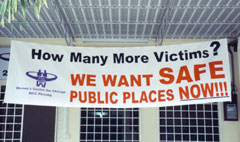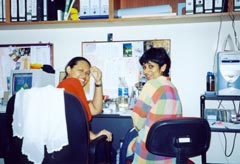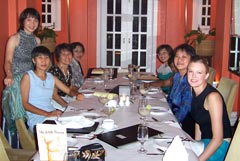Women's Centre for Change (WCC), Penang, Malaysia
 While less glamorous than some human rights projects, the struggle to change social and cultural attitudes towards women is an important one in many countries around the world. I spent the last eight weeks of my summer working as a legal intern for the Women's Centre for Change (WCC) in Penang, Malaysia. The organization is a local NGO dedicated to improving the status of women in Malaysian society and supporting women and children in crisis. The WCC began as the Women's Crisis Centre in 1985 to provide assistance and services to women in crisis, particularly victims of domestic violence. In 2002, the name was changed to the Women's Centre for Change to reflect the organization's new role and focus. While still providing counseling and other services to women, the centre also engages in community outreach programs to promote awareness of women's rights and gender equality and is actively involved in law reform in an effort to improve the legal status of women.
While less glamorous than some human rights projects, the struggle to change social and cultural attitudes towards women is an important one in many countries around the world. I spent the last eight weeks of my summer working as a legal intern for the Women's Centre for Change (WCC) in Penang, Malaysia. The organization is a local NGO dedicated to improving the status of women in Malaysian society and supporting women and children in crisis. The WCC began as the Women's Crisis Centre in 1985 to provide assistance and services to women in crisis, particularly victims of domestic violence. In 2002, the name was changed to the Women's Centre for Change to reflect the organization's new role and focus. While still providing counseling and other services to women, the centre also engages in community outreach programs to promote awareness of women's rights and gender equality and is actively involved in law reform in an effort to improve the legal status of women.
 The WCC is a very small organization with only a few paid staff and no administrative support; dedicated volunteers are its life-blood. While at times the lack of resources was challenging, it also meant that my presence made a real impact and was sincerely appreciated by the centre. The WCC currently has only one full-time legal officer, so my addition to the team immediately doubled our legal staff!
The WCC is a very small organization with only a few paid staff and no administrative support; dedicated volunteers are its life-blood. While at times the lack of resources was challenging, it also meant that my presence made a real impact and was sincerely appreciated by the centre. The WCC currently has only one full-time legal officer, so my addition to the team immediately doubled our legal staff!
During my eight weeks with the WCC, I did just about anything that had to be done, but my work fell into three primary categories. Most of my work was very similar to what I had been doing earlier in the summer while working for a large Bay Street firm. I was doing legal research and writing memos, the only difference was the issues. I extensively researched and wrote on the Malaysian and comparative law concerning public interest intervention, judicial review, and the domestic application of international human rights norms in preparation for two national legal conferences that the WCC was going to host. The second task was more administrative in nature. The staff legal officer and I spent much of our time organizing the conference on Developing Public Interest Intervention Techniques that the WCC held in Kuala Lumpur on August 24th, which was attended by many of the leading lawyers in Malaysia. The remainder of my time was spent on non-legal advocacy, which included preparing a booklet on healthy relationships for teens, writing a magazine article on sexual harassment, an article for the Bar magazine on women's rights, and many Letters to the Editor in response to newspaper reports and comments which were offensive to women. I realized how important non-legal advocacy can be in promoting awareness and understanding about women's rights.
Sometimes I found that my non-legal expertise was just as valuable to the centre as my legal training. While at the WCC I helped staff members resolve technical issues with their computers and helped establish a wireless network in the office, which expanded the number of computers with internet access from one to three.
 While I feel that I was able to make a real contribution during my short internship with the WCC, the experience of living and working in Penang was a profound one for me personally. I had traveled extensively in Asia previously, but when traveling you usually only see a glimpse of a society. Malaysia is a medium-developed country according to the UN Development Index, one with constitutionally guaranteed civil rights and formal equality for women. Yet I saw first-hand how those rights can be circumscribed by a government that doesn't respect them and how formal equality is meaningless in the face of social, cultural and religious forces that prevent women from being treated as fully human. At times, I felt extremely frustrated, such as when I was told that our public rally to promote awareness of violence against women was cancelled because police refused to issue the required permit or when I read newspaper editorials written by men who believed that marriage gives men absolute rights over their wives. (There is no rape within marriage in Malaysian law and domestic violence was legal until 1994.) But I was also encouraged and inspired by the dedication and energy of the women who work and volunteer at the centre. As advocates for women's rights, they are part of a small, but loud and well-organized, minority in Malaysian society.
While I feel that I was able to make a real contribution during my short internship with the WCC, the experience of living and working in Penang was a profound one for me personally. I had traveled extensively in Asia previously, but when traveling you usually only see a glimpse of a society. Malaysia is a medium-developed country according to the UN Development Index, one with constitutionally guaranteed civil rights and formal equality for women. Yet I saw first-hand how those rights can be circumscribed by a government that doesn't respect them and how formal equality is meaningless in the face of social, cultural and religious forces that prevent women from being treated as fully human. At times, I felt extremely frustrated, such as when I was told that our public rally to promote awareness of violence against women was cancelled because police refused to issue the required permit or when I read newspaper editorials written by men who believed that marriage gives men absolute rights over their wives. (There is no rape within marriage in Malaysian law and domestic violence was legal until 1994.) But I was also encouraged and inspired by the dedication and energy of the women who work and volunteer at the centre. As advocates for women's rights, they are part of a small, but loud and well-organized, minority in Malaysian society.
 The women who work and volunteer at the centre were also amazingly warm, welcoming, and friendly. Not only were they co-workers, but also my social event coordinators. This was actually essential to a happy internship, given that I was likely the only intern in the entire city of Penang - I knew no one. They found me a great place to live, adopted me into their families, invited me out with their friends, and even sometimes functioned as a taxi service to ensure that I was able to enjoy my time in Penang. Many evenings were spent eating amazing Chinese, Indian or Malay food, watching movies, or shopping. Most weekends involved hill hiking, touring the island, and parties with friends. They encouraged me to take scuba lessons after work, and on my final weekend in Malaysia, I went on a diving trip to the east coast we saw sharks, sea turtles, rays, and countless types of fish and coral. The friendship of the women at the WCC and the opportunity to learn from them was what made my internship unforgettable.
The women who work and volunteer at the centre were also amazingly warm, welcoming, and friendly. Not only were they co-workers, but also my social event coordinators. This was actually essential to a happy internship, given that I was likely the only intern in the entire city of Penang - I knew no one. They found me a great place to live, adopted me into their families, invited me out with their friends, and even sometimes functioned as a taxi service to ensure that I was able to enjoy my time in Penang. Many evenings were spent eating amazing Chinese, Indian or Malay food, watching movies, or shopping. Most weekends involved hill hiking, touring the island, and parties with friends. They encouraged me to take scuba lessons after work, and on my final weekend in Malaysia, I went on a diving trip to the east coast we saw sharks, sea turtles, rays, and countless types of fish and coral. The friendship of the women at the WCC and the opportunity to learn from them was what made my internship unforgettable.


 While less glamorous than some human rights projects, the struggle to change social and cultural attitudes towards women is an important one in many countries around the world. I spent the last eight weeks of my summer working as a legal intern for the Women's Centre for Change (WCC) in Penang, Malaysia. The organization is a local NGO dedicated to improving the status of women in Malaysian society and supporting women and children in crisis. The WCC began as the Women's Crisis Centre in 1985 to provide assistance and services to women in crisis, particularly victims of domestic violence. In 2002, the name was changed to the Women's Centre for Change to reflect the organization's new role and focus. While still providing counseling and other services to women, the centre also engages in community outreach programs to promote awareness of women's rights and gender equality and is actively involved in law reform in an effort to improve the legal status of women.
While less glamorous than some human rights projects, the struggle to change social and cultural attitudes towards women is an important one in many countries around the world. I spent the last eight weeks of my summer working as a legal intern for the Women's Centre for Change (WCC) in Penang, Malaysia. The organization is a local NGO dedicated to improving the status of women in Malaysian society and supporting women and children in crisis. The WCC began as the Women's Crisis Centre in 1985 to provide assistance and services to women in crisis, particularly victims of domestic violence. In 2002, the name was changed to the Women's Centre for Change to reflect the organization's new role and focus. While still providing counseling and other services to women, the centre also engages in community outreach programs to promote awareness of women's rights and gender equality and is actively involved in law reform in an effort to improve the legal status of women. The WCC is a very small organization with only a few paid staff and no administrative support; dedicated volunteers are its life-blood. While at times the lack of resources was challenging, it also meant that my presence made a real impact and was sincerely appreciated by the centre. The WCC currently has only one full-time legal officer, so my addition to the team immediately doubled our legal staff!
The WCC is a very small organization with only a few paid staff and no administrative support; dedicated volunteers are its life-blood. While at times the lack of resources was challenging, it also meant that my presence made a real impact and was sincerely appreciated by the centre. The WCC currently has only one full-time legal officer, so my addition to the team immediately doubled our legal staff!  While I feel that I was able to make a real contribution during my short internship with the WCC, the experience of living and working in Penang was a profound one for me personally. I had traveled extensively in Asia previously, but when traveling you usually only see a glimpse of a society. Malaysia is a medium-developed country according to the UN Development Index, one with constitutionally guaranteed civil rights and formal equality for women. Yet I saw first-hand how those rights can be circumscribed by a government that doesn't respect them and how formal equality is meaningless in the face of social, cultural and religious forces that prevent women from being treated as fully human. At times, I felt extremely frustrated, such as when I was told that our public rally to promote awareness of violence against women was cancelled because police refused to issue the required permit or when I read newspaper editorials written by men who believed that marriage gives men absolute rights over their wives. (There is no rape within marriage in Malaysian law and domestic violence was legal until 1994.) But I was also encouraged and inspired by the dedication and energy of the women who work and volunteer at the centre. As advocates for women's rights, they are part of a small, but loud and well-organized, minority in Malaysian society.
While I feel that I was able to make a real contribution during my short internship with the WCC, the experience of living and working in Penang was a profound one for me personally. I had traveled extensively in Asia previously, but when traveling you usually only see a glimpse of a society. Malaysia is a medium-developed country according to the UN Development Index, one with constitutionally guaranteed civil rights and formal equality for women. Yet I saw first-hand how those rights can be circumscribed by a government that doesn't respect them and how formal equality is meaningless in the face of social, cultural and religious forces that prevent women from being treated as fully human. At times, I felt extremely frustrated, such as when I was told that our public rally to promote awareness of violence against women was cancelled because police refused to issue the required permit or when I read newspaper editorials written by men who believed that marriage gives men absolute rights over their wives. (There is no rape within marriage in Malaysian law and domestic violence was legal until 1994.) But I was also encouraged and inspired by the dedication and energy of the women who work and volunteer at the centre. As advocates for women's rights, they are part of a small, but loud and well-organized, minority in Malaysian society. The women who work and volunteer at the centre were also amazingly warm, welcoming, and friendly. Not only were they co-workers, but also my social event coordinators. This was actually essential to a happy internship, given that I was likely the only intern in the entire city of Penang - I knew no one. They found me a great place to live, adopted me into their families, invited me out with their friends, and even sometimes functioned as a taxi service to ensure that I was able to enjoy my time in Penang. Many evenings were spent eating amazing Chinese, Indian or Malay food, watching movies, or shopping. Most weekends involved hill hiking, touring the island, and parties with friends. They encouraged me to take scuba lessons after work, and on my final weekend in Malaysia, I went on a diving trip to the east coast we saw sharks, sea turtles, rays, and countless types of fish and coral. The friendship of the women at the WCC and the opportunity to learn from them was what made my internship unforgettable.
The women who work and volunteer at the centre were also amazingly warm, welcoming, and friendly. Not only were they co-workers, but also my social event coordinators. This was actually essential to a happy internship, given that I was likely the only intern in the entire city of Penang - I knew no one. They found me a great place to live, adopted me into their families, invited me out with their friends, and even sometimes functioned as a taxi service to ensure that I was able to enjoy my time in Penang. Many evenings were spent eating amazing Chinese, Indian or Malay food, watching movies, or shopping. Most weekends involved hill hiking, touring the island, and parties with friends. They encouraged me to take scuba lessons after work, and on my final weekend in Malaysia, I went on a diving trip to the east coast we saw sharks, sea turtles, rays, and countless types of fish and coral. The friendship of the women at the WCC and the opportunity to learn from them was what made my internship unforgettable.